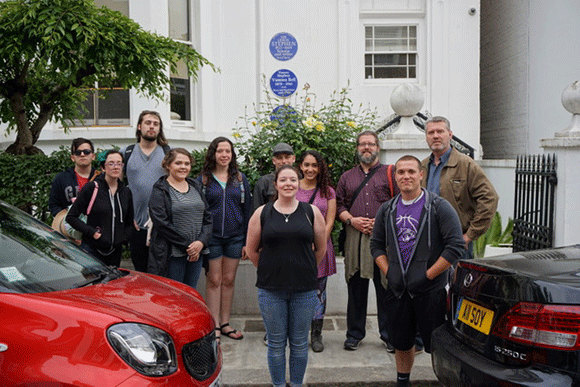Promises of visiting a new world of cultures, landscapes, and people surely flashed into the minds of many optimistic students.

The prospect of an international trip was a bright one.
Promises of visiting a new world of cultures, landscapes, and people surely flashed into the minds of many optimistic students. Classes and curricula were patterned after the schedule of events that would have occurred overseas, and students were prepared. For some, the possibility to venture out of the United States and into another country as part of the college experience was a once-in-a-lifetime opportunity. Even professors urgently awaited the realizations of their educational quests, the end of the courses which they designed, and the experiences that would have helped shape who they are, as well as their students.
All the while, the threat of the coronavirus loomed.
For those in the Literary London class, the creation of which is credited to Drew Shannon, Professor of English, and Jim Bodle, Professor of Psychology, the reality of COVID-19 was all too relevant. Nevertheless, hopes held firm. The culmination of this class would still, of course, consist of the transatlantic voyage to London.
As Shannon noted in a recent interview, “It’s always good for students to get out of the U.S. [and]...see other cultures akin to our own.” The cultural significance of this trip is, truly, astronomical. The sophisticated socialization alone that students would obtain in their two-week stay in England would be worth the wait.
It wouldn’t be long until students could see Kensington Gardens and 22 Hyde Park Gate, the birthplace of the one-and-only Virginia Woolf, who once frequented the neighborhood and immortalized the whereabouts in legend. Taking the Tube, as the Brits call it, students would then arrive at the National Gallery and the National Portrait Gallery, which houses thousands of paintings dating all the way back to the 13th century. The very majesty of such loci entertains the imaginations of many.
But news of the coronavirus once more demanded its way into the classroom. Outbreaks began circling closer to home, though surely it wouldn’t become a problem. The scholarly journey would still happen, just as long as the virus could be contained.
Students would still have the pleasure of visiting Lyme Regis, the environs in which “The French Lieutenant’s Woman” was set. Maybe, if all goes well, students would be able to wander through Regent’s Park and see, approach, and yes—even feed the Queen’s swans. Big Ben and Westminster Abbey would be wonders to behold and remember for years to come.
But the coronavirus finally put a stop to these aspirations, its incessantness resulting in the closure of the University and the cancellation of all trips, both international and domestic. Those hoping to complete their degrees at this time had to do so online through the newly implemented video-conferencing app called Zoom. Rather than in-person and compelling academic discourse, an adventure abroad, and a well-rounded collegiate experience, those of the Literary London course looked forward to the technological awkwardness of computerized conversation, solitude and isolation from others, and nerve-racking updates of a world desperately trying to accommodate for the unprecedentedness of the pandemic.
Both professors and students alike were distraught.
Nevertheless, along with the rest of the world, they endured the new vicissitudes of life and found purpose and value in such strange circumstances.
As Shannon points out, “Academics, readers, and writers are well-suited for this kind of thing.”
Among the few benefits the coronavirus pandemic actually provided were the vast stretches of time and availability to work on school assignments, occupational obligations, or even creative projects that we’ve been meaning to do. Introverts likely flourished in these conditions.
However, the same could probably not be said for others. Regardless, these are bizarre times for everyone, and we each have yet to fully adapt to such incertitude and different ways of life. Many previous activities and outside-based endeavors will have to be postponed until the pandemic passes.
“I’m getting the itch to travel,” Shannon says. “I’m missing that.”
Though no matter how ludicrous or despondent things get, we will prevail. The human spirit is a difficult thing to quell. The choice course of action at this point forward is to remain hopeful, patient, and compliant to the protocols essential to our safety.
The prospect of a world post-pandemic is, truly, a bright one.

A photo of the group that visited Virginia Woolf's house on a London trip in 2018.
Left to right: Quentin Lunsford, Danielle Watson, Evan Zuelke, Emma Sule, Sara Croswell, Brian Wesley, Kirsten Franken, Sasha Feldmann, Drew Shannon, Max Gramke, John McCoy

